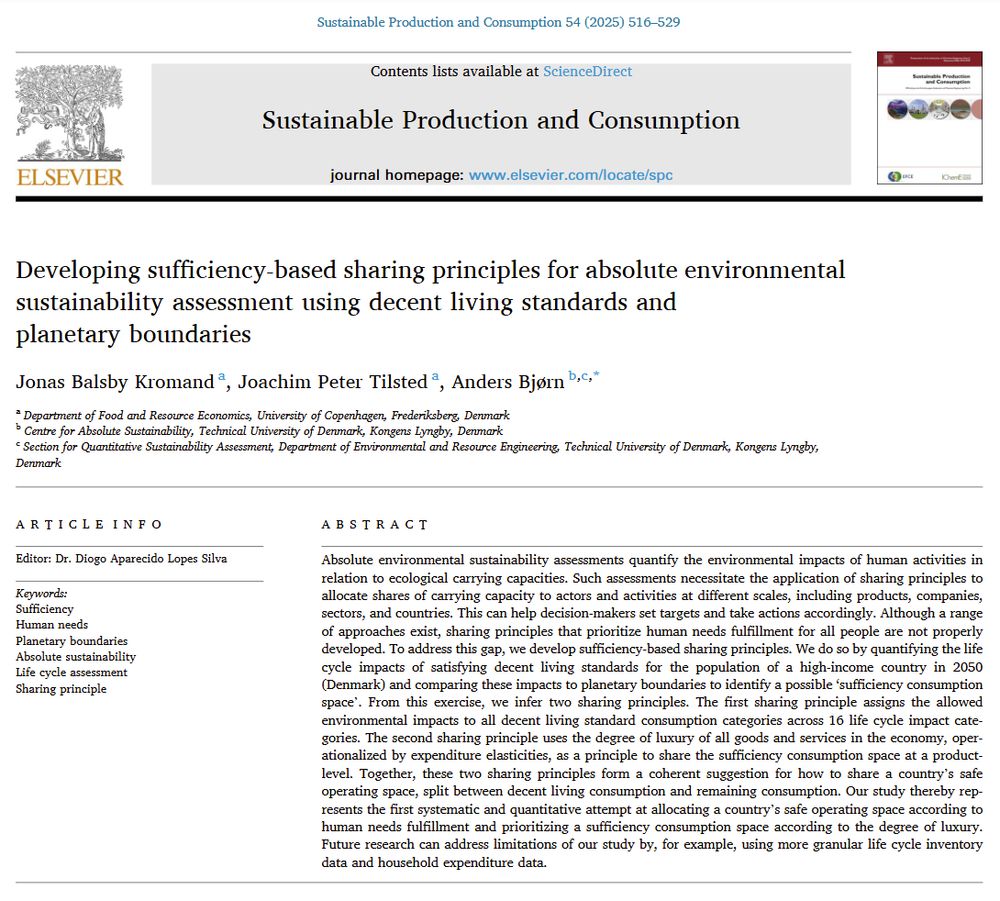
I know I have, so I tried to write one. It is out tomorrow, asking how we analytically should approach whether it is too little, too late and who benefits.

I know I have, so I tried to write one. It is out tomorrow, asking how we analytically should approach whether it is too little, too late and who benefits.

Klimarådet siger det. Klimabevægelsen siger det. Selv Dansk Industri siger det. Vi skal have pejlemærker for drivhusgasudledninger relateret til forbrug.
Men hvad skal de være? Det har vi i Klima- og Omstillingsrådet nogle bud på.

Klimarådet siger det. Klimabevægelsen siger det. Selv Dansk Industri siger det. Vi skal have pejlemærker for drivhusgasudledninger relateret til forbrug.
Men hvad skal de være? Det har vi i Klima- og Omstillingsrådet nogle bud på.
5/x

5/x
4/x

4/x
3/x

3/x
In this paper, we explore why and how the use of fossil hydrocarbons for non-energy purposes (as raw material for synthetics) changes how we should approach the climate crisis.
1/x
www.tandfonline.com/doi/full/10....

In this paper, we explore why and how the use of fossil hydrocarbons for non-energy purposes (as raw material for synthetics) changes how we should approach the climate crisis.
1/x
www.tandfonline.com/doi/full/10....
Link to paper: eur02.safelinks.protection.outlook.com?url=https%3A...

Link to paper: eur02.safelinks.protection.outlook.com?url=https%3A...
For impact categories where additional ecological space below the boundaries exists, we allocate that space across activities by degree of luxury.

For impact categories where additional ecological space below the boundaries exists, we allocate that space across activities by degree of luxury.
For climate impacts, this is partly because the variables for the planetary boundary for climate change are already above their boundary level (419 vs. 350 ppm and +2.79 vs. +1 W/m²).

For climate impacts, this is partly because the variables for the planetary boundary for climate change are already above their boundary level (419 vs. 350 ppm and +2.79 vs. +1 W/m²).
Many approaches exist, but we argue that we should start from a premise of sufficiency—prioritising goods and services that enable the satisfaction of human needs.

Many approaches exist, but we argue that we should start from a premise of sufficiency—prioritising goods and services that enable the satisfaction of human needs.
In a new paper with @jonaskromand.bsky.social and Anders Bjørn, we try to answer that question. We suggest allocating carrying capacity to ensure the fulfilment of human needs.
eur02.safelinks.protection.outlook.com?url=https%3A...


In a new paper with @jonaskromand.bsky.social and Anders Bjørn, we try to answer that question. We suggest allocating carrying capacity to ensure the fulfilment of human needs.
eur02.safelinks.protection.outlook.com?url=https%3A...
"The plant might best be understood as a $1.65 billion government subsidy to the fossil fuel industry shrouded behind discourses of economic revitalization and low-carbon futures."
doi.org/10.1080/2469...

"The plant might best be understood as a $1.65 billion government subsidy to the fossil fuel industry shrouded behind discourses of economic revitalization and low-carbon futures."
doi.org/10.1080/2469...

TV2's vinkel: "Har du styr på din affaldssortering"?

TV2's vinkel: "Har du styr på din affaldssortering"?
The crisis, rather, is about maintaining fossil fuel hegemony beyond energy.
www.sciencedirect.com/science/arti...

The crisis, rather, is about maintaining fossil fuel hegemony beyond energy.
www.sciencedirect.com/science/arti...


Two major findings to me:
1) There is no way around limits to production (even if considering climate change only)
2) no matter the approach, principles of distributive justice are critically important.
portal.research.lu.se/en/publicati...

Two major findings to me:
1) There is no way around limits to production (even if considering climate change only)
2) no matter the approach, principles of distributive justice are critically important.
portal.research.lu.se/en/publicati...
So thrilled that this is happening after four years of research. I cannot wait to share the thesis in full in a week or two.


So thrilled that this is happening after four years of research. I cannot wait to share the thesis in full in a week or two.

